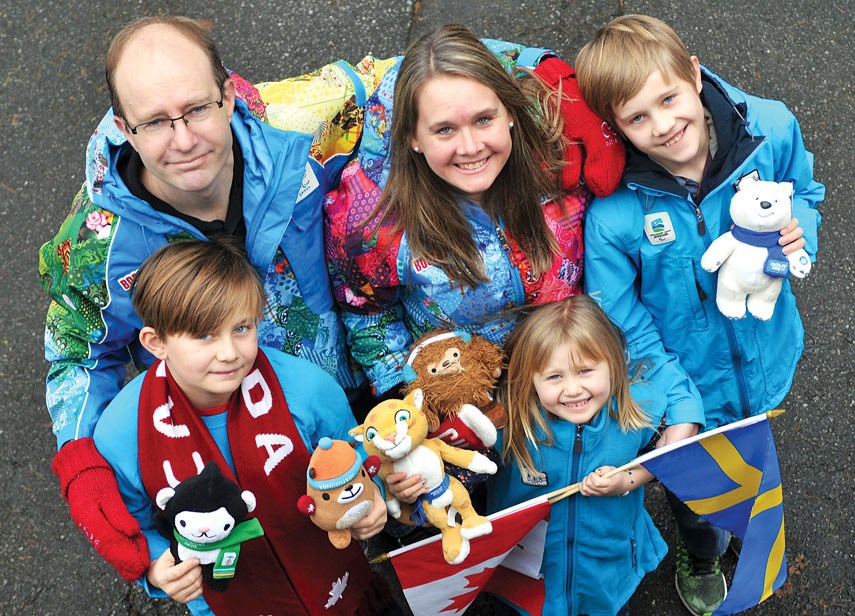Trained, focused, and prepared, Jenny Hippel is set to leave West Vancouver for PyeongChang in South Korea for her third consecutive Olympics.
She’s not an athlete but a volunteer, one of the 22,400 drivers, organizers, troubleshooters, cake-deliverers and stagehands who maintain the world’s largest athletic spectacle.
“Giving back to community is something you do. That’s the way I was raised,” Hippel says.
Speaking to the North Shore News about 24 hours before she’s set to head to the airport, Hippel is preparing birthday presents, Valentine’s Day cards, and other items intended to ease the burden of her absence on her husband and three children.
“The plane goes tomorrow morning so, ready or not, I need to be ready,” she says.
Hippel has spent 18 months preparing for the next few weeks, acquainting herself with cultural customs and familiarizing herself with the region’s geography.
“I’m very good at navigating when there are mountains around,” she says, briefly digressing to explain the challenge of comprehending street signs with Cyrillic lettering during the Sochi Games.
While it may seem counterintuitive, Hippel’s Olympic expectations are based on not quite knowing what to expect.
“It’s always different each time, every day is different, every hour is different.”
She tries to go in with no expectation and be pleasantly surprised.
It works for the Olympics, she says, and for “anything in life.”
Most Olympic volunteers are omnipresent and integral while simultaneously going “un-thanked and unknown,” says Chris Winter, a Handsworth grad who represented Canada at the 3,000 metre steeplechase in the 2016 Rio Olympics.
As Winter makes the transition from high-level athlete to, “a little bit more of a regular human being,” he reflects on the two-week spectacle of the Olympics.
“As an athlete, you’re kind of in this little bubble, and they’re a part of that bubble,” he says of the volunteers. “They kind of make or break it.”
Volunteers tend to be patriots excited to show their country to the world or passionate fans who cross oceans on their own dime to work for free.
“The volunteers are kind of the human face of the Games,” he says. “The smiles are always on their face no matter if they’re standing out in the parking lot or inside a venue with you.”
Discussing the 2016 Games, Winter recalls what looked like a “10-mile long line of buses,” leading into Rio for the closing ceremonies. He remembers the volunteers who handed out ponchos and lunches to athletes waiting to take the field.
After the Carnival-inspired ceremony concluded, Winter danced with volunteers amid a downpour.
Volunteers need to be detail-oriented but they also need a well of enthusiasm, Winter says.
“Sport and really society wouldn’t work without volunteers.”
North and South Korea are set to discuss the totalitarian regime’s involvement in the Games at a diplomatic outpost in the demilitarized zone following North Korea’s announcement that it plans to send a delegation to the Games, according to a recent L.A. Times article.
“It’s giving a chance for diplomacy,” Winter says of the development. “It shows what sport can do and it still has that ability to bring peace to the world.”
For volunteers staying in PyeongChang during the one-week lull between the Olympic and Paralympic games – including Hippel – there are no accommodations or meals provided, according to a release from the Olympic committee.
It doesn’t dissuade Hippel.
“Being a volunteer I get to see things and be closer to things than I would if I had a paying role,” she says. “What really hits home to me are the personal moments, sitting and skyping perhaps with an athlete and their family back home.”
She remembers riding in a bus packed with paralympians, bouncing through the mountains to a coastal village in Russia and taking a moment to wish her son a happy seventh birthday when the entire bus erupted into song. The athletes belted out “Happy Birthday” for a dumbfounded son and his humbled mother.
“He was overwhelmed that someone would do that for him,” Hippel says.
The Olympics offer a chance to do something different, Hippel says.
“We all get wrapped up in the rat race . . . especially as a parent getting things done for the family and getting work done and this and that for others, and sometimes you have to refocus on yourself,” she says. “But (with) volunteering, even if you’re focusing on yourself, you’re focusing on others.”
Discussing the reason for her enthusiasm, Hippel recalls a discussion she had with a Quebec police officer during the 2010 Vancouver Games.
“He said . . . ‘Everybody wants to be with the best of the best because, daily, we don’t deal with that.’”
It’s an opportunity to mingle with high achieving goal setters while getting a “glimpse of the world,” Hippel says.
Growing up, Hippel was a competitive swimmer who says she once told her parents she wanted to “meet everybody in the world.” The Olympics are a way to bridge those two passions.
Having experienced the Olympics as an athlete, Winter says he’d love to have that experience again.
“I personally want to be part of as many Games going forward as I can because there’s nothing like it on the planet,” he says. “I would definitely encourage anybody to – if they’re thinking about it to go and do it – if they’re not thinking about it to maybe think about it.”



